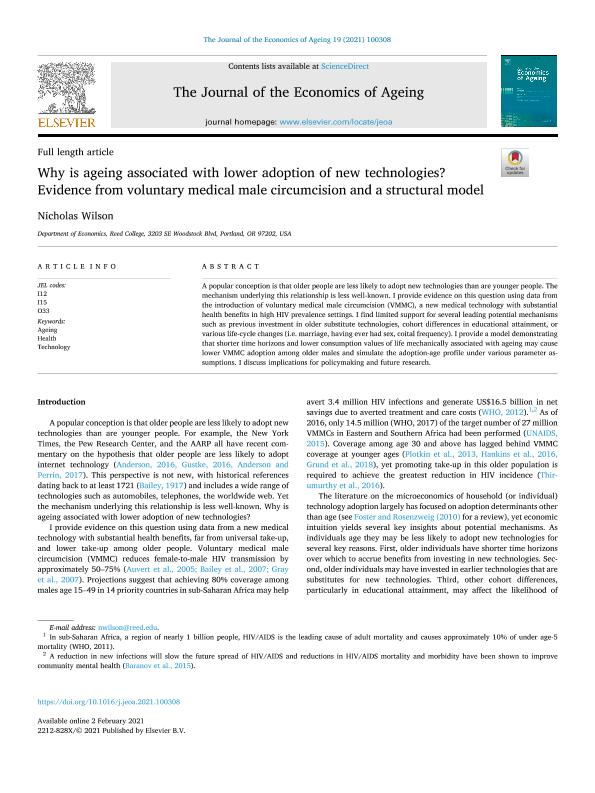Why is ageing associated with lower adoption of new technologies? Evidence from voluntary medical male circumcision and a structural model

Contenido multimedia no disponible por derechos de autor o por acceso restringido. Contacte con la institución para más información.
| Tag | 1 | 2 | Valor |
|---|---|---|---|
| LDR | 00000cab a2200000 4500 | ||
| 001 | MAP20210030666 | ||
| 003 | MAP | ||
| 005 | 20211022124010.0 | ||
| 008 | 211022e20210614esp|||p |0|||b|spa d | ||
| 040 | $aMAP$bspa$dMAP | ||
| 084 | $a931.2 | ||
| 100 | 1 | $0MAPA20210034374$aWilson, Nicholas | |
| 245 | 1 | 0 | $aWhy is ageing associated with lower adoption of new technologies? Evidence from voluntary medical male circumcision and a structural model$cNicholas Wilson |
| 520 | $aA popular conception is that older people are less likely to adopt new technologies than are younger people. The mechanism underlying this relationship is less well-known. I provide evidence on this question using data from the introduction of voluntary medical male circumcision (VMMC), a new medical technology with substantial health benefits in high HIV prevalence settings. I find limited support for several leading potential mechanisms such as previous investment in older substitute technologies, cohort differences in educational attainment, or various life-cycle changes (i.e. marriage, having ever had sex, coital frequency). I provide a model demonstrating that shorter time horizons and lower consumption values of life mechanically associated with ageing may cause lower VMMC adoption among older males and simulate the adoption-age profile under various parameter assumptions. I discuss implications for policymaking and future research. | ||
| 650 | 4 | $0MAPA20080568771$aEnvejecimiento | |
| 650 | 4 | $0MAPA20200021438$aAgeingnomics. Economia senior | |
| 650 | 4 | $0MAPA20100044407$aPersonas mayores | |
| 773 | 0 | $wMAP20210010194$g14/06/2021 Volumen 19 - 2021 , 16 p.$tThe Journal of the economics of ageing $dOxford : Elsevier ScienceDirect, 2021- |

